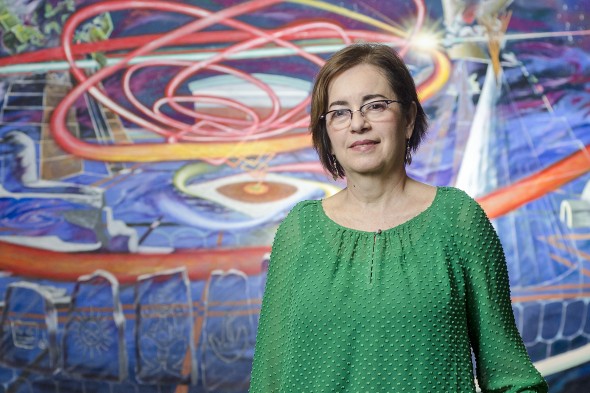Latino Cultural Center director connects food, culture and memory

Rosa Cabrera, director of the Latino Cultural Center, developed the idea for the center’s lecture series on the history and culture of chocolate around the world. Photo: Joshua Clark/UIC Photo Services
Those of us who love chocolate — and who doesn’t — aren’t surprised that the ancient Maya and Aztecs couldn’t say enough in praise of it.
It’s not just that these ancient Mesoamerican cultures, dating back to 750 B.C., found the stuff to be mouth-wateringly delicious. “They believed chocolate had magical and divine properties,” says Rosa Cabrera, director of the Latino Cultural Center, who thought up the center’s ambitious lecture series linking chocolate to history and cultural around the world.
The eight-part “Chocolate: Drink of Gods, Food of Mortals” ran from Sept. 20 to April 9 with presentations organized by Mario Lucero, the center’s assistant director. Among the presenters was Joel Palka, associate professor of anthropology and thesis adviser for Cabrera’s Ph.D. He talked about the beginnings of chocolate and its historical influence in Mesoamerican cultures.
Another presenter, La Catrina Café owner Salvador Corona, showed off his chocolate mole recipe, winner of the last “Mole de Mayo” competition in Pilsen. Molly Doane, associate professor of anthropology, talked about how fair trade practices help fight exploitative conditions and low prices for chocolate producers. El Colectivo Altepee, a youth group from Veracruz, Mexico, told a story about chocolate through music and dance.
An exhibit on chocolate created by the cultural center opens this month at the Daley Library, developed by Lena Guerrero Reynolds, a graduate student in museum and exhibition studies. Programs were also presented at the National Museum of Mexican Art, 1852 W. 19th St.
The chocolate series was a collaboration between the cultural center, the museum, the anthropology department and the Latin American and Latino studies program. “As we do at the cultural center, we were trying to link culture to contemporary life,” Cabrera said.
From commodity to snack for the masses
Chocolate was central to the cultures of the Maya and later the Aztecs. It was the Aztecs who introduced it to Spanish conquistadores, “who they had mistaken for gods,” she said. In turn, the Spanish reworked the original spicy and vanilla recipes of chocolate drinks by adding sugar and creating the sweet and milky solid confection we now know as chocolate, she said. “At first it was a European commodity and later became a snack for the masses,” she said.
“For us the interesting thing about chocolate is that as a global commodity, it gives us an opportunity to connect people of different backgrounds, and tie it to environmental and social issues like climate change and unfair labor practices,” Cabrera said.
Before she joined UIC in 2011, Cabrera was on staff at the Field Museum, where she helped develop a chocolate exhibit that traveled the country. At the museum she headed a team that worked with the Pilsen community and the West Ridge’s South Asian community to understand how cultural values impact eco-friendly activities.
The team was a project of the city’s then-Department of the Environment on how to engage communities in a climate action plan. “The monarch butterfly migrates from the U.S. to Mexico through the Midwest,” Cabrera said. “Pesticides and deforestation have diminished the butterfly habitat. So the butterfly is a metaphor for immigration alongside climate change.”
When she came to UIC, “one of the things I wanted to do was take the topic of chocolate and have people in the community tell stories about chocolate in their families to explore the relationship between culture, memory food and identity,” she said.
Life journey
Cabrera was born in Cuba and spent her first 14 years there before coming to Chicago. “We moved to the North Side, starting in Edgewater and ending up in Ravenswood, where I’ve been for 30 years,” she said. She earned a bachelor of arts in design and a Ph.D. in anthropology, both from UIC.
Her husband, Nelson, is a manager for Car-X Auto Service. Their daughter, Katrina, 35, is a Chicago Public Schools art teacher, and their son, Alec, 26, works for United Airlines.
Cabrera has taught courses in anthropology and social justice for teachers, community leaders and college students. She lectures extensively on the role of ethnic museums and cultural centers in shaping community identity — the topic of her Ph.D. dissertation. She has collaborated with the museum community on national projects such as “The Immigration Sites of Conscience Network,” “The National Diversity Education Program” and the “Race: Are We So Different? Project.”
